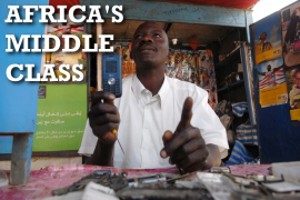 When the world’s largest manufacturer of household items decided to enter the East African market last year the move may have signaled that the region’s growing middle class is now being taken seriously by international markets. While the fledgling industry faces competition from bootleg products, discerning clients in the region are demanding the best and they are willing to foot the higher bill that goes along with a quality product.
When the world’s largest manufacturer of household items decided to enter the East African market last year the move may have signaled that the region’s growing middle class is now being taken seriously by international markets. While the fledgling industry faces competition from bootleg products, discerning clients in the region are demanding the best and they are willing to foot the higher bill that goes along with a quality product.
The company is just one of many now flocking to Africa to take advantage of its growth and potential. According to the Economist, citing figures from Standard Bank, Africa now has a fast-growing middle class – around 60 million people now have incomes of $3,000 which is expected to reach 100 million by 2015. Add to this the growing rate of investments which has increased tenfold in the past decade and the claims of Africa being the current “next frontier” for business opportunities seem to be confirmed.
While companies may be tempted to take advantage of the opportunities that exist in many African countries, specific risks may hold them back from taking the final step.
One of the challenges this company faced was finding a suitable local distributor with experience and a built-in network of end-users. With a regional hub located in Kenya, the company was able to locate a well-known distributor with expertise in household products and a network that included distribution to major supermarkets. The next hurdle to finalizing the partnership is one that is quite common in these circumstances.
“In many cases, when a company from Europe or North America sets up shop in the region, their strategy is to partner with a local company in order to gain a stronger foothold in the market. Differences in business culture and expectations can derail the process unless both parties are able to find common ground,” notes ATI’s Underwriter, Rennie Kariuki.
Some of the obstacles that can derail the process include a lack of capacity on the part of local companies to meet the demand of buyers that are used to supplying mass quantities of high quality products. To meet this demand often requires capital intensive investments in equipment, transportation, warehousing and staffing. This can be the make or break point for some local companies who want to expand and take advantage of incoming opportunities but lack access to credit facilities and financing.
For the Kenyan distributor the offer by the multinational company to assume the right to be their sole distributor was one they simply could not refuse. How they were going to comply to the company’s request for a guarantee with the additional expenses they would naturally incur under the terms of the contract would prove to be the ‘elephant in the room’ question.
After assessing the options, the distributor opted to take out an ATI policy in place of a bank guarantee. In the end, the decision was based solely on a cost-benefit analysis. The ATI policy effectively would provide the ‘guarantee’ the company needed to protect their receivables valued at over $600,000 against any type of payment default risk on the part of the local supplier while the flat fee would save the supplier thousands of dollars in operating capital that would not have to be used as collateral.
“Bank guarantees can be quite costly for companies. First, banks generally charge in the range of 0.5% per quarter and on top of that they require collateral in the form of property or capital to secure the loan. This can be crippling to a growing company that does not have the margins to support this extra outflow of money,” adds Rennie, who also has an extensive background in commercial banking.
With rising lending rates and growing volumes of business coming from international clients, African banks are riding a very lucrative wave. How long the trend will last is unclear. What is clear is that local companies can continue to expand using an alternative and more cost effective source of guarantees. From household products to manufactured goods, commercial risk insurance can offer a practical option.
Notifications